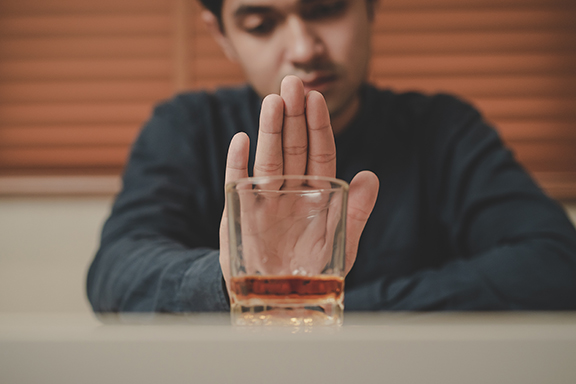April is Alcohol Awareness Month when we solemnly recognize the impacts of alcohol abuse on society, workplaces, families, and individuals. According to the National Institute on Alcohol Abuse and Alcoholism, over 10% of people over the age of 12 faced an alcohol problem in the past year. This means that if you don’t live with alcohol addiction, it’s likely that someone in your family, community, or workplace does.
Alcohol abuse continues to be misunderstood as a moral failure or character flaw, when in reality it is a brain disease that causes painful symptoms for the person affected and their loved ones. By raising awareness about alcohol abuse, we can help others be more likely to catch the signs and seek support when it’s needed.
What are the physical and psychological signs of alcohol addiction?
Alcohol is in a unique position compared with other addictive substances because using it, at least to some extent, is so normalized in our society. Many people who use illicit (“hard”) drugs are at least partially aware that they may have a problem with addiction, but most people who drink alcohol are not addicted.
When someone has an addiction to alcohol, they may be diagnosed with alcohol use disorder. In everyday terms, this disorder is sometimes called “alcoholism.”
It’s important to be aware of the warning signs of alcohol addiction so that you can be ready to seek, or offer, support for yourself or loved ones.
Alcohol use disorder can manifest both physically and psychologically.
Some psychological and behavioral signs of alcohol addiction include:
- You crave and think about alcohol when you’re not drinking.
- You find it difficult to control how much you drink.
- You keep drinking even though it’s causing problems in your life.
- Your mind is often preoccupied with thoughts of drinking.
- You drink alone, or hide or lie about your drinking from others.
- You neglect your responsibilities because of drinking.
- Your relationships are strained due to your alcohol use, and your loved ones have told you that they’re concerned.
- You’ve tried to quit or cut down on drinking but have been unsuccessful.
- You experience mood swings or irritability when not drinking.
- You experience legal issues related to your drinking, such as DUIs.
- You engage in risky behaviors while intoxicated, such as driving under the influence or unprotected sex.
- You experience physical symptoms such as shaking, sweating, or nausea when not drinking.
- You prioritize drinking over other activities or hobbies.
- You experience financial problems due to spending money on alcohol.
- You feel guilty or ashamed about your drinking but continue to do so.
- You experience changes in your appearance or hygiene due to alcohol use.
- You find it hard to relax or have fun without alcohol.
- You turn to drinking to cope with stress, anxiety, or depression.
Alcohol addiction, especially when it’s severe, can also have some physical effects. Physical signs of alcohol addiction may include:
- You may notice changes in your appearance, like gaining or losing weight.
- You might experience tremors or shakes, especially in the morning.
- You notice you have a red or puffy face due to flushed or broken capillaries.
- You might feel chronically fatigued or lethargic.
- You could suffer from gastrointestinal issues such as nausea, vomiting, or diarrhea.
- You may experience liver-related symptoms like jaundice or abdominal pain.
- You might have an increased tolerance to alcohol.
- You could experience withdrawal symptoms such as sweating, rapid heartbeat, or anxiety when not drinking.
- Long-term effects on your body could include liver disease, pancreatitis, or cardiovascular problems.
Not everyone with an alcohol problem experiences these signs. Even if you don’t experience these things, that doesn’t necessarily mean you do not have alcohol use disorder. The only way to know for sure is to talk to a mental health provider or your primary care physician.
Signs of substance abuse at work
Even though things have changed in recent years, alcohol continues to play an important role in many workplaces (for example, employees may drink at holiday parties or during happy hour gatherings). This can make it difficult to be able to tell when an employee has an alcohol abuse problem and when their drinking is within “normal” limits.
Some signs that someone at work has alcohol use disorder include:
- They’re frequently absent or tardy, especially when they didn’t used to have these problems.
- Their job performance or productivity has noticeably declined.
- You detect the smell of alcohol on their breath or notice other physical signs of intoxication.
- They exhibit mood swings or changes in behavior, such as irritability or aggression.
- They tend to isolate themselves from coworkers or avoid social interactions.
- They make frequent trips to the restroom, possibly to hide drinking.
- They seem to struggle with concentration or decision-making.
- They experience financial difficulties or borrow money from coworkers.
- Their appearance has changed, such as unkempt attire or poor hygiene.
- They make excuses for their behavior or deny any alcohol-related issues when confronted.
How to get help for alcohol addiction
If you suspect that you or a loved one is experiencing a problem with alcohol, the importance of seeking professional treatment can’t be stressed enough. Alcohol use disorder is a brain disease that can get worse when left untreated.
Seeking support is nothing to be ashamed of. Again, alcohol abuse is not a moral failure and says nothing about your character. It is a serious health condition that affects over 10% of the population.
It’s normal for people with alcohol use disorder to be ambivalent about getting treatment. Part of you may want badly to stop your problem drinking, but you likely also have personal reasons why you drink, to begin with – it helps you in social situations, it helps you to sleep, and so on. This is normal, and treatment providers expect ambivalence. You do not have to be 100% sure to seek help. You only need to take the first step.
Ambivalence also means that you may experience pushback from your loved one. Although this can be incredibly painful, try to understand that it’s normal and a symptom of the way alcohol addiction affects the brain. Offer steady support without disrespecting their autonomy.
You can look for a treatment provider by calling the Substance Abuse and Mental Health Services Administration (SAMHSA)’s National Helpline at 1-800-662-HELP (4357).
Does my employee assistance program (EAP) cover substance abuse?
Your EAP is also a free resource at your disposal. The MINES & Associates EAP can offer you 24/7 free and confidential counseling and resource referral for alcohol use disorder. If your company is enrolled, then you just need to call (800) 873-7138 or use our digital intake form to get started.
To Your Well-Being,
The MINES Team












Leave A Comment